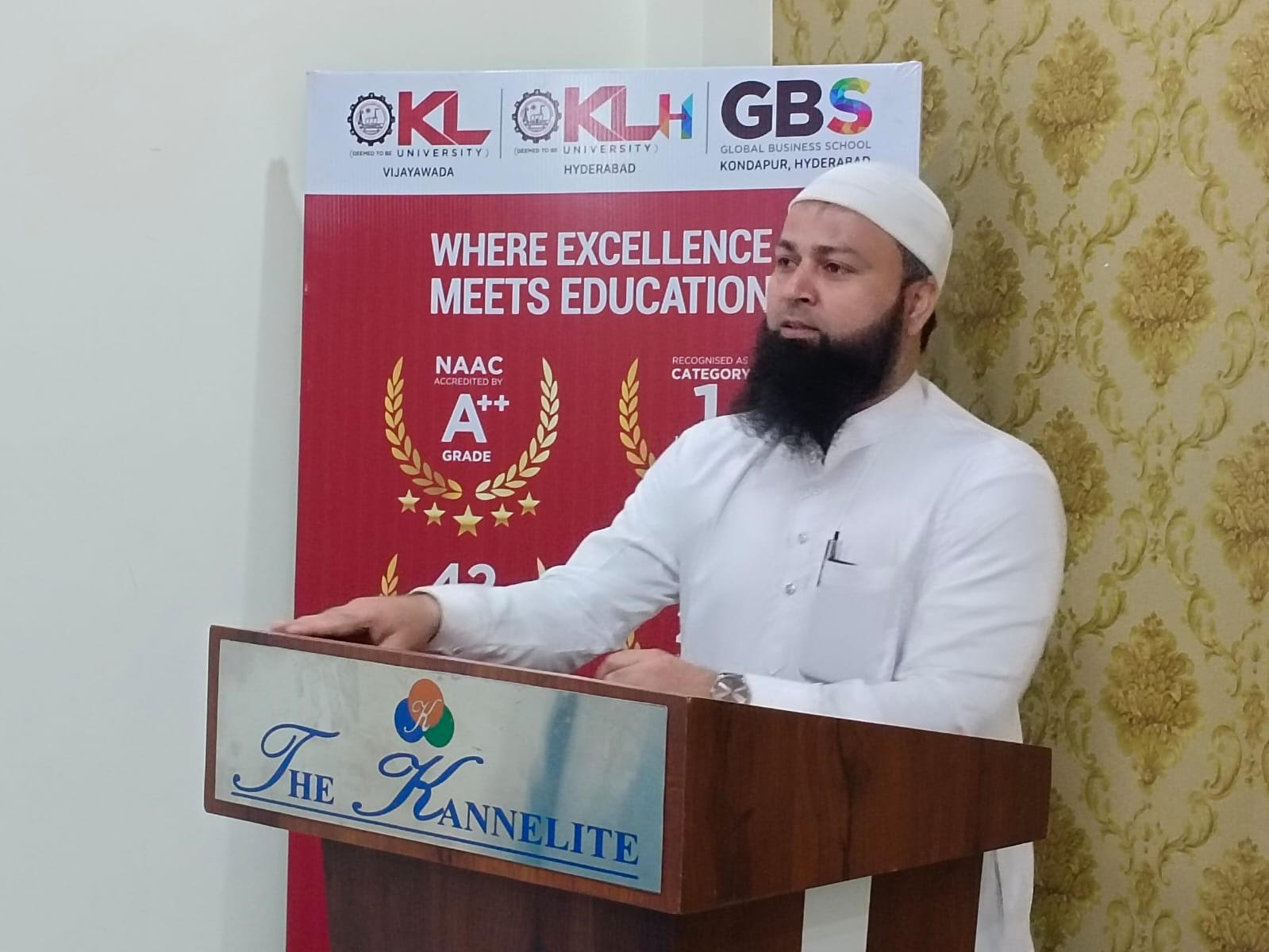
Zeb Akhtar/Ranchi
Syed Tariq Alam has been quietly transforming lives, supporting poor and underprivileged families through education, employment, and social welfare in the Kolhan region of Jamshedpur.
Kolhan is known for its natural beauty and vibrant tribal culture. The district of the Seraikela-Kharsawan, a part of this region, still struggles to keep pace with development. Economic hardships, limited education, and scarce employment opportunities are other challenges here.
On the outskirts of this district lies Kapali, a small township just 20 kilometres from Jamshedpur — the industrial hub of eastern India. Jamshedpur draws thousands of labourers from across the country, many of whom settle in Kapali, where living costs are lower. While these workers find temporary employment in the steel city, the jobs are often low-paying and unstable. This insecurity directly affects their children’s education, leading to high dropout rates in Kapali and nearby areas.
 Tariq Alam delivering a lecture
Tariq Alam delivering a lecture
It was this grim reality that moved Syed Tariq Alam. Determined to bring change, he embarked on a mission that has now become a beacon of hope for thousands. For the past 13–14 years, Tariq and his dedicated team — including Shaud Alam, Shabbir Hussain, Adil Malik, and Sarfaraz Ahmed — have been working tirelessly.
Tariq believes, “If society is to change, it must start with the children.” With this conviction, he established the Ash Shamsh Anglo Urdu Middle School in Kapali. Founded three years ago, the school has become a ray of hope for families who wish to educate their children but cannot afford it. Today, 56 students receive free education, including books and uniforms. Even their learning materials are funded by Tariq and his foundation.
The school’s admission process is transparent and personalised. Tariq and his team personally visit homes to assess families’ economic conditions before selecting he candidates to be admitted to the school. Since the foundation has no major income source, funding comes largely from Tariq’s own pocket and contributions from well-wishers. A few donors do offer support, covering teacher salaries, books, and other expenses.
.jpg) Tariq Alam at a blood-donation camp
Tariq Alam at a blood-donation camp
Tariq recalls how it all began with just two rented rooms. Today, the school has four classrooms and a small office. From the start, he has placed special emphasis on educating girls. Over the past five years, more than 1,000 girls from poor families have received free computer education. “If girls are given both education and technology,” says Tariq, “they can change the destiny of their entire families.” At least five students from the school have progressed to senior secondary institutions, continuing their education beyond Class 10 and 12.
Recognising the importance of livelihood, Tariq also launched a technical training centre in Kapali. Having worked as an engineer abroad, he was keen to provide local youth with similar opportunities. At this centre, underprivileged youth receive free technical training. So far, over 3,000 young men have secured jobs in Gulf countries. This has not only improved the financial condition of their families but also ensured the education of their siblings.
A unique feature of this initiative is its built-in support network. When Tariq’s associates abroad announce new job openings, they give priority to trainees from Kapali.
.jpg) Tariq Alam celebrating Independence Day
Tariq Alam celebrating Independence Day
For those preferring to stay in India, the foundation helps them find jobs in various parts of the country. Over 500 youths have already joined jobs in India.
Tariq Alam and his team approach community service with a broad humanitarian vision. Under the Pradhan Mantri TB Mukt Bharat Abhiyan, they adopted ten Sabar tribal families, providing them with free ration for a full year.
During the COVID-19 crisis, they set up isolation centres and organised.vaccination drives. For the past seven years, they have conducted regular blood donation camps, saving countless lives. Every Ramadan, the foundation distributes kits to 50 poor families
.jpg) A classroom in Tariq Alam's school at Kapali.
A classroom in Tariq Alam's school at Kapali.
These initiatives reflect Tariq’s holistic approach — addressing not just education and employment, but every essential human need.
In 2014, Tariq and his colleagues formally established the Alam Welfare Foundation. While their work had begun earlier, the foundation brought structure and continuity to their efforts. Today, under its banner, the school operates, and technical training is provided, and multiple welfare programs run simultaneously. The foundation’s guiding principle is simple: “Where there is need, there must be help.”
Making a difference in a small area with limited resources was never easy. Tariq admits that they began with determination and passion. Gradually, friends and well-wishers joined, and the mission gained momentum.
.jpg) Students of Tariq Alam's school flaunting their certificates
Students of Tariq Alam's school flaunting their certificates
Today, Tariq Alam is recognised not only in Kapali or Seraikela-Kharsawan but throughout the Kolhan region as a changemaker.
Syed Tariq Alam’s work is a testimony to the fact that one doesn’t need a lot of resources for transforming society. It requires vision and commitment.
READ MORE: Scientist turned educator Sajid’s ‘Schoologium’ is revolutionising education
The story of Kapali is not just about one town in Jharkhand; it is a message for the entire nation — that hope, when paired with action, can truly bring change.
